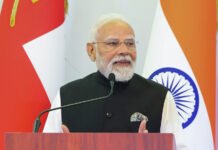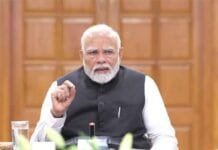In a pivotal development, the Financial Action Task Force (FATF) has, for the first time, directly recognized state-sponsored terrorism as a grave threat to global peace and security. This recognition is detailed in FATF’s July 2025 “Comprehensive Update on Terrorist Financing Risk” report, marking a significant evolution in the organization’s stance on how terrorism is financed and supported.
This acknowledgment is not only a turning point in global counter-terrorism policy but also a diplomatic victory for India, which has consistently raised concerns over state-sponsored terrorism—particularly implicating Pakistan. The report’s detailed analysis of terrorist financing networks, with a specific focus on Pakistan-based groups like Lashkar-e-Taiba (LeT) and Jaish-e-Mohammed (JeM), underlines the intensifying scrutiny of nations that use terror as an instrument of state policy.
FATF Officially Flags State-Sponsored Terrorism
For decades, FATF has played a critical role in setting standards and promoting effective implementation of measures to combat money laundering, terrorist financing, and the proliferation of weapons of mass destruction. However, until now, state involvement in sponsoring terrorism remained a politically sensitive grey area.
The July 2025 report breaks new ground by explicitly stating that:
“State-sponsored terrorism poses a clear, present, and escalating risk to international security, financial systems, and regional stability.”
This is a first-of-its-kind formal recognition from FATF, widely viewed as a powerful global watchdog in financial integrity. The implication is clear: countries actively financing or harboring terrorists will now face more intense monitoring, scrutiny, and potential sanctions.
India’s Long-Awaited Victory on the Global Stage
India has, for years, taken a firm stance on Pakistan’s role in supporting cross-border terrorism, bringing this issue to numerous international forums including the United Nations, Interpol, and the G20.
The FATF’s acknowledgment is being seen as a strategic triumph for India’s diplomatic efforts. It affirms New Delhi’s long-standing claims that Pakistan’s military and intelligence agencies have provided logistical, financial, and ideological support to groups operating with the explicit intent to destabilize India.
A Resounding Validation of India’s Claims
In its recent findings, FATF reports that:
Terror outfits based in Pakistan continue to raise funds via formal banking channels and informal hawala networks.
Terrorists have leveraged e-commerce platforms to procure materials used in attacks.
Front organizations posing as charities are used to launder money and route it to extremist groups.
These revelations directly support India’s assertions and corroborate intelligence inputs shared by Indian agencies over the years. The international legitimization of India’s security concerns represents a turning point in the global fight against terror financing.
Mounting Pressure on Pakistan
Pakistan, which has frequently been in the FATF spotlight and has only recently been removed from its “grey list”, is now facing renewed heat. The latest report has named and shamed Lashkar-e-Taiba and Jaish-e-Mohammed, two of the most lethal terror outfits operating out of Pakistan.
Damning Evidence of Pakistan’s Involvement
FATF’s report highlights:
Direct procurement of explosive materials via Pakistani e-commerce sites.
Frequent money transfers through shell companies and crypto assets.
Utilization of NGOs as funding fronts for terror operations.
By pointing to state complicity, FATF is sending a strong message that financial sovereignty cannot be used as a shield for sponsoring terrorism.
The report warns that countries found guilty of promoting terrorism as a state policy will face enhanced monitoring, multilateral sanctions, and international isolation.
Terrorist Financing Patterns: Deep Dive into Methodology
The FATF’s July 2025 update outlines evolving financing tactics adopted by state-backed terror networks. The findings provide an intricate breakdown of how terror money moves across borders, evading detection and exploiting regulatory loopholes.
Key Trends in Terrorist Financing:
Use of Digital Platforms: Terrorist operatives are purchasing chemicals, drones, and digital communication tools via online shopping platforms under fake identities.
Cryptocurrency Exploitation: Untraceable crypto wallets have become prime tools for cross-border terror fund transfers, especially in regions with weak crypto regulations.
Hawala Networks & Cash Couriers: Despite global crackdowns, informal money transfer systems remain active in South Asia and the Middle East.
Charitable Fronts: Legitimate-looking religious and humanitarian organizations have been exposed as fronts for laundering terror funds, often operating under state protection.
The Global Impact: Redrawing the Map of Counter-Terror Finance
FATF’s updated definitions and analysis set the stage for more aggressive global action against state-linked terror financing. This will likely reshape international counter-terror efforts in the following ways:
Stricter Compliance Mandates for financial institutions operating in regions with a history of terror funding.
Enhanced Cross-Border Intelligence Sharing between law enforcement, security, and financial watchdogs.
Intensified Diplomatic Pressure on countries like Pakistan to dismantle terror infrastructure.
Implications for India’s Counter-Terror Strategy
For India, the report represents both validation and a strategic boost. Indian policymakers and intelligence agencies now have globally recognized evidence to push for:
Stronger global sanctions against countries aiding terror.
UN resolutions targeting entities and individuals exposed by FATF.
Increased bilateral cooperation with like-minded nations to curb the financial ecosystem sustaining terrorism.
India is expected to leverage this report in upcoming multilateral forums, pushing for tighter financial blacklisting and international accountability for nations sheltering or funding terrorists.
The Road Ahead: Turning Words into Action
FATF’s landmark acknowledgment must now translate into real, enforceable actions. The burden lies on the global community to ensure that nations cannot escape accountability by weaponizing terrorism as statecraft.
FATF’s recommendations include:
Expanded use of targeted financial sanctions.
Real-time financial surveillance tools.
Closing legal loopholes that allow “charitable” terror financing fronts.
Public disclosure of violators and enablers.
Conclusion: A New Era of Accountability Begins
The FATF’s 2025 report is more than a document—it’s a declaration of intent. By recognizing state-sponsored terrorism as a systemic and dangerous threat, the global watchdog has sent a clear signal: those who finance terror will be held accountable, even if they operate from within government walls.
This shift represents a watershed moment in international diplomacy, a validation of India’s persistent efforts, and a wake-up call for those who believed they could operate with impunity. As FATF raises the bar, the world must now follow with firm, united, and decisive action.
















